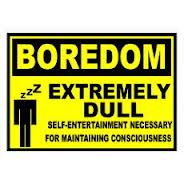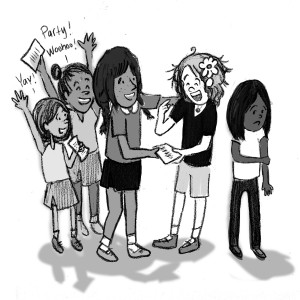|
|
September 26, 2013
Got an email from Concerned Mom whose smart, funny daughter has no trouble making friends, but lots of trouble keeping them. The pattern is this: Daughter gets close to other girls and feels accepted by them. Then, within weeks new found friends exclude and then ignore the girl. Naturally, she feels upset and alone, which, of course breaks Mom’s heart. She turned to me for advice and here’s what I told her:
I understand that it breaks your heart to see your daughter so unhappy. Of course you want her to make real friends who treat her with affection, kindness and respect. But it feels like something is missing in your email.
Each time your daughter is disappointed by a new friend you’ve listened to her side of the story, sympathized and offered comfort and support. All good! But there are at least two sides to every relationship story. That’s why I am curious about what’s going on from the other girls’ perspectives. Maybe you’re also wondering why each of these new friends turn against your daughter after such a short time? It’s a mystery worth exploring.
What might your daughter be doing (knowingly or unknowingly) to contribute to this reaction she often gets? How about if you ask her: “Why do you think ____ stopped wanting to be your friend?”
This question may bring up a lot of emotion, so please ask it in a neutral tone of voice. You’re not accusing your daughter of anything! You’re simply inviting her to put aside her sadness and think about what may be going on here. Right now, she’s hurt and confused and probably feeling powerless. She can regain some of her power by understanding how she functions in friendships because she plays a significant role in every one of them, whether she’s aware of it yet or not. To encourage her to think about that role you need to ask thoughtful, open-ended questions that have no “right” or “wrong” answers. Questions like “Why do you think this girl stopped being your friend?”
Listen to your daughter with an open heart and mind. Try not to interrupt. Initially, she may not say much. She might just shrug and say, “I don’t know.” In which case you might nod understandingly and say, “It’s hard to know why other people do what they do. But we usually have a reason. Your friends have been rude to you. If you could just guess why, what would you guess?”
Your daughter may have fallen into the habit of thinking of herself as a powerless victim to whom other people do unkind things. That’s not a good mental place for her to be. We want our girls to understand emotions (their own and other people’s). We also want them to feel confident in their ability to make and keep real friends. That includes learning to rebound from set-backs and to negotiate the ups and downs of relationships.
I hope this helps.
In friendship,
Annie
*Illustration by Erica De Chavez, from my upcoming The Girls Q&A Book on Friendship
UPDATE October 3, 2014: The Girls Q&A Book on Friendship: 50 Ways to Fix a Friendship Without the DRAMA is now available in print and on Kindle (the ebook can be read on any device, your mobile phone, tablet, or computer with the free Kindle reader app). Visit GirlsQandA.com for an excerpt, reviews, and to order your copy.

September 23, 2013
A friend just informed me that her 14-year-old granddaughter, Samantha, was approached by a few classmates on the first day of school and told, “Everyone hates you, Samantha. You know that, don’t you?”
Apparently Sami was clueless, so the news understandably did her in for the rest of the day. She wasn’t too keen on going to school the next morning, either.
We know kids are kids and they often need our help. So what’s our usual helpful advice in these situations?
A) Ignore those mean girls.
B) Pretend it doesn’t bother you.
C) Give them a taste of their own bitchiness right back at them.
D) Diffuse the tension with humor.
E) If the harassment gets really bad, switch schools.
F) None of the above.
F is the answer, even though most well-meaning adults believe the remedy to bullying is in the hand’s of the victim. (See A-E) Apparently we’re not trying to change the abuser’s behavior… only the victim’s response! Does anyone but me see how crazy that is?
 I'm gonna do what I want and you can't stop me! Think about it this way: If a preschooler brought a baseball bat to school and started beating other kids over the head, teachers would disarm the abuser in a hot New York minute. They wouldn’t waste a second telling the victims to “ignore” the abuse. They’d shut-down the bat-wielder. Then they’d bring in BatKid’s parents and work together to educate that child and help him or her become a caring and responsible member of the school community. That’s the appropriate and effective way to help the victims and the aggressive child as well.
So what’s in the way of taking the same direct, common sense preschool approach to mean-kid behavior in middle and high schools? Can someone please tell me because I’ve been working on this stuff for over 30 years and I still don’t get why the solution eludes us.

September 5, 2013
Let me tell you something, kids. It’s easier to think about bullying as something “out there” that someone else is doing. It’s easier to think of yourself as a nice girl or a good guy. That kind of thinking may be easy, comforting even, but it’s wrong. The urge to shut someone up or down, to make them sorry for what they’ve done, is in every one of us. Not an inspiring thought. Nothing to be proud of. But it’s true.
 She'll be sorry... When you’re jealous because someone you love loves someone else more, or you’re embarrassed because someone called you out in front of everyone… you feel so angry you want to do whatever it takes to bring down the people who hurt you. So you attack them with a fierce hate that you hope will draw blood. And if you make your victim cry, scare him or her so badly they’re afraid to ride the bus or step inside the lunchroom, you might feel powerful… for a moment. But that’s not who you are. And it’s not even close to where your true power lies.
We wish there was no bullying in school. Nice thought. And how do you think that’s going to happen? Hint: It’s got nothing to do with changing other people.

August 21, 2013
 Updated February 6, 2014 Updated February 6, 2014
One of the three Oklahoma teens charged in the murder of Christopher Lane said “We were were bored. So we decided to kill someone.” There’s so much that’s crazy scary about that statement, I don’t know where to start.
I’ll start here: I know nothing about those bored kids, but they’re clearly suffering from acute empathy deficit. That speaks to the current state of parenting and teaching. It also speaks to the violence and cruelty that passes for entertainment and online “bonding,” but I’m going to keep this short and to the point.
Not all teachers are parents watching out for the well-being of their own offspring. But an educator’s job description includes teaching your students to be ethical people, who are respectful to others. It used to go without saying that ethics and social responsibility (we called it Good Citizenship) were part of every every class, every grade level, every day. People became teachers not only because they loved chemistry or English literature or geometry, but because they found purpose and pride in their ability to connect with students, mind-to-mind and heart-to-heart. Teachers took their role as mentors very seriously.
As for parents who are raising children and guiding them into adulthood, all of us are teachers and mentors and influencers. If we’re not consistently teaching our kids to be good people who can responsibly manage their emotions (and their boredom) then we’re failing our kids. And in so doing, we’re making our families, schools and communities much less safe for all of us.
UPDATE: The three teens who allegedly shot Chris Lane are due in court on Tuesday, February 11th.
 — Older Posts »
| |















